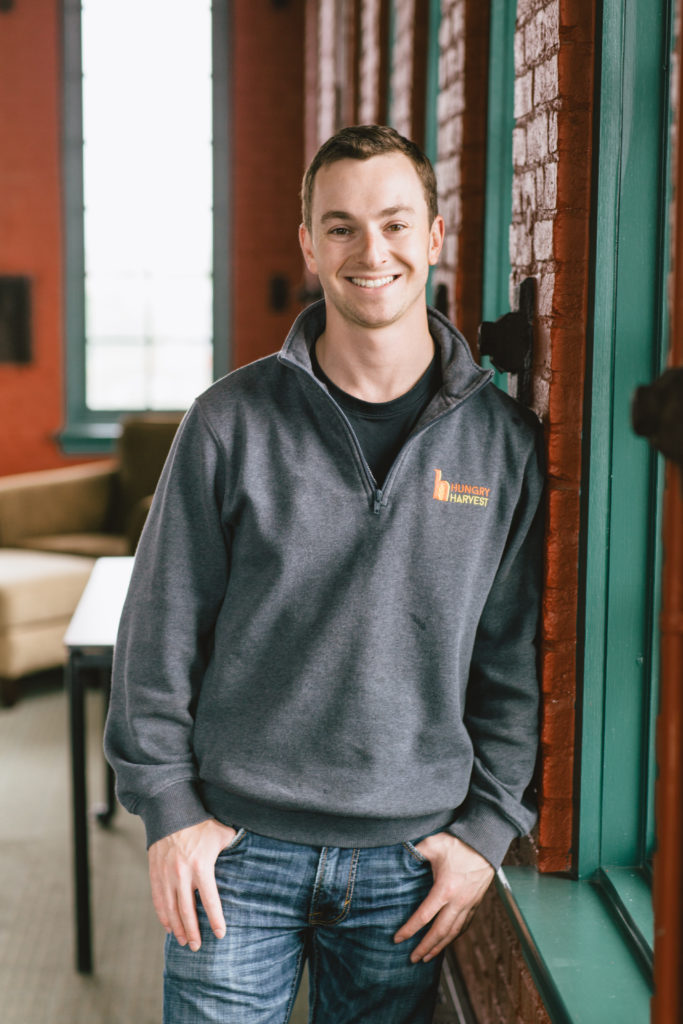
Did you know… each year, 125 billion pounds of food go to waste in the U.S. A large portion of this is due to small physical blemishes or not meeting a sizing threshold for grocery buyers. Once Evan Lutz realized there was all this perfectly delicious food available, he set out to change the world the one ugly apple at a time. Today, Evan and his company, Hungry Harvest, is making an impact in Philadelphia and other regions. For every box of ugly produce that would otherwise go unsold, Hungry Harvest provides someone in need the ability to eat fresh, healthy food.
As Evan shares in his TEDx Talk, he believes “no food should go to waste and no person should go hungry.” From starting in a dorm basement, the social entrepreneur is now recognized locally as a Sustain PHL 2018 award recipient, as well a nationally on the Forbes 30 Under 30 list. We’re thrilled to sit down and learn more about his business, his experience on Shark Tank, and his advice for young entrepreneurs.
Philly PR Girl (PPRG): We love your company’s mission of eliminating food waste, while simultaneously fighting hunger. Tell us more about how you came up with this vision.
Evan Lutz (EL): My entire life, I’ve been interested in social entrepreneurship. I’m fascinated by the idea of using business to power social change. In my senior year at the University of Maryland, I took a Social Innovation class. The main project consisted of starting a social enterprise. An idea arose when a farmer was talking to the class about the amount of produce he was unable to sell. Whether it was a surplus caused by weather, buyers cancelling on him, or the arbitrary sizing requirements from buyers, his product was being rejected. After learning about his challenges, I set up a farm stand in the basement of my dorm and sold his surplus produce at $5 for 5 lbs. The first week, we had 10 customers. The next week, we had 20. As the stand was small, I realized we had several value propositions that were appealing, and this stand could scale rapidly.
First, we were reducing food waste. Second, we were helping supplement this farmer’s income. Third, we bought the produce for very cheap, so we could pass on that discount to customers. I thought to myself – if I can just sell this, there might be a viable business here. So I created a marketing/PR campaign to raise awareness of my farm stand, called the Recovered Food CSA at the time. By the end of the semester, we had 500 customers per week. The stand was a hit – and I knew this was an idea I wanted to pursue. Around graduation time, I officially formed the LLC and turned the farm stand into a home-delivery based model of the same concept.
PPRG: Congratulations on recently being a Sustain PHL 2018 award recipient for business innovation! Can you provide some insight on the impact Hungry Harvest has on sustainability?
EL: Thank you! We’re honored to be recognized for the work we are doing by Philadelphia’s sustainability community. It was amazing to highlight the collective efforts of activists, businesses, and individuals to make the city a greener place. One of the two problems that Hungry Harvest tackles is food waste, which has a massive impact on the environment. Not only is the food going to waste but also the precious resources used to grow, wash and transport it. All this accounts for 14% of all U.S. water consumption and 176 million metric tons of greenhouse gas emissions. To put it in perspective, that’s equal to the emissions of a car driving 431 billion miles— all spent growing perfectly good produce that goes uneaten.
Every harvest delivery saves at least 10 pounds of produce. Every pound of that produce reduces water waste, greenhouse gas emissions, and our dependence on oil. Since the company started four years ago, Hungry Harvest has rescued over 8 million pounds of produce, reducing 376 million gallons of water waste, and eliminating 2300 cars-worth of emissions. Additionally, we have donated over 750,000 pounds of produce to local hunger solving organizations, like Philabundance, who serves food to approximately 90,000 people around Philly every week.
PPRG: We’re also big fans of the Philadelphia non-profit, Philabundance! Tell us more about that partnership and how it works.
EL: In each market, the purchases made by our Harvest Heroes helps to support our donations to local hunger-solving organizations. When expanding to Philadelphia, we did a ton of research on the organizations addressing food insecurity in the region. After reading about the history of Philabundance, we knew they fit with our mission. The organization started as a food rescue organization because their founder, Pamela Rainey Lawler, saw that perfectly good food was going to waste. This was all the while 1 in every 5 Philadelphians live in hunger. Our mirrored missions made it easy to connect and to support their programming. Since we opened our Philadelphia market, we’ve worked closely with their Food Acquisition team to donate of fresh, rescued produce to the organization.
PPRG: In 2016, you pitched your business idea on ABC’s show, Shark Tank, and received more than what you originally asked for from Robert Herjavec. What have you gained from the experience?
EL: After Shark Tank, any public speaking gig or pitch competition seems relatively easy— that show is intimidating! I learned valuable skills for public presenting and speaking, and how important preparation is for events like Shark Tank. I sat down and studied every episode for three weeks, wrote down the questions, thought of strategic answers, and memorized all of them. I practiced staying poised under pressure, and even practiced with a pretend shark tank panel— that wound up being even more difficult than the actual show! Shark Tank exploded the Hungry Harvest’s growth, as it quadrupled the size of our customer base. We see a slight bump every time we are re-aired on CNBC. Showing our business concept to 6-8 million people helped drive awareness of the issues we’re trying to solve, and of course, our brand name.
PPRG: You recently launched your produce-delivery service to South Florida, Detroit and Raleigh—all within the past year! Do you plan on continuing to grow your service area?
EL: Yes! We’re planning on launching at least 30 more cities over the next few years. There’s food waste everywhere, and there’s hunger everywhere. We’ve seen demand for our product across the U.S. from tens of thousands of people who have signed up for our waitlist. It’s our duty to fulfill that demand so we can help solve food waste and hunger in more places than the cities we currently operate in.
PPRG: What can we expect for the future of Hungry Harvest?
EL: We’re constantly innovating on our product, growing our team, and furthering the amount and depth of our impact. Our goal is to rescue 100,000,000 pounds of food in a few years and serve 1,000,000 people per week through our subscription boxes and other programs. Our team is always growing, so make sure to check out our hiring page!
PPRG: What excites you the most about where your company and team are headed?
EL: We’re set up to make a serious dent in reducing hunger in the cities we serve. A couple of years ago, we thought of a plan to go a few steps beyond just donating produce, as we started a program called Produce In A SNAP. The idea is simple: we set up farm stands at schools, community centers, or hospitals in areas of high food insecurity, and sell our bags of produce at the discounted rate of $7. These areas are often considered food deserts: an area where it’s difficult to buy fresh and affordable food. This solution allows customers to use SNAP/EBT (commonly known as Food Stamps), since SNAP recipients can only use it at point-of-sale systems, not online like the rest of our business.
Since we started this program in 2016, we’ve expanded to 29 sites across Baltimore, and soon Philadelphia, Raleigh, and Washington DC. We’ve sold over 21,000 bags, and served 4,500 individuals. In addition to granting people access to food, we’re also educating children on healthy eating. Often the students running the stands will bring their parents back the next week and ask them to buy specific types of produce that they tried the week prior.
PPRG: What’s one of your main company goals that will truly make an impact in the community of industries of food waste and food insecurity?
EL: Our goal is to feed 20% of the food insecure population of Baltimore over the next five years, and make a similar impact in any other city we’re in, including Philadelphia. There are approximately 200,000 food insecure residents of Baltimore, and we’ve served 2.25% of them (4,500 individuals). We’re well on our way to making tremendous impact through Produce In A SNAP.
PPRG: As a 2017 Forbes 30 Under 30, what advice would you give young entrepreneurs?
EL: In business, there are very high highs and very low lows. It’s of utmost importance that you stay poised no matter the situation and don’t allow your circumstances to affect your morale. A good practical tip I received once was comparing entrepreneurship to high school. In high school, when you received a bad grade, got turned down by a crush, or failed to make the cut on a sports team, it felt terrible. Looking back on it now, you think how naïve you were to take those defeats as hard as you did.
The same goes for entrepreneurship. You have to go into business prepared for ideas to get rejected. A key employee will decide to leave, there will be bad press, the website will crash, and production runs will cost more than expected. These are just some of the instances of failures that happen every day. Trust me, there are many more. It’s my opinion that great companies are built on how they handle failure. If companies can handle failure well and ingrain it as part of their DNA – they have a much higher likelihood of success. Failure is acceptable, as long as you learn from it, don’t repeat it, and move on.
PPRG: What inspires you? Are there any other causes you’re passionate about?
EL: Mortality inspires me. That may sound dark, but it’s actually quite the opposite. I realize we only have a given amount of time on this planet. I decided early on in life to give everything I have to making as much impact as possible. The vehicle I use to make such impact is business.
PPRG: When you’re not working hard on social innovation, where are your favorite go-to spots in and around Philadelphia?
EL: I’ve always been a huge fan of history, so I try to budget time to see some of the many museums throughout Philadelphia. I have yet to pick a favorite, but I’m looking forward to checking out the Museum of the American Revolution next. I also enjoy a good run on the Schuylkill River Trail, hanging out with the Philly team at one of the local breweries or beer gardens, and checking out the amazing food scene in the city.
As Hungry Harvest continues to expand, be sure to follow them on Facebook, Twitter, and Instagram to help save the world — one ugly apple at a time.






